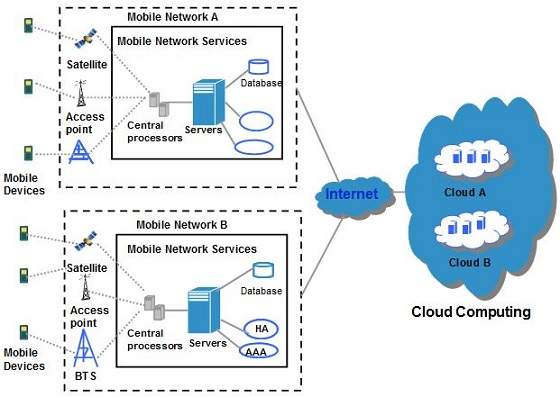Mobile Cloud Computing
Cloud Computing offers such smartphones that have rich Internet media support, require less processing and consume less power. In terms of Mobile Cloud Computing (MCC), processing is done in cloud, data is stored in cloud, and the mobile devices serve as media for display. Today smartphones are employed with rich cloud services by integrating applications that consume web services. These web services are deployed in cloud. There are several Smartphone operating systems available such as Google’s Android, Apple’s iOS, RIM BlackBerry, Symbian, and Windows Mobile Phone. Each of these platforms support third-party applications that are deployed in cloud.
Architecture and Working
MCC includes four types of cloud resources:
- Distant mobile cloud
- Distant immobile cloud
- Proximate mobile computing entities
- Proximate immobile computing entities
- Hybrid
The following diagram shows the framework for mobile cloud computing architecture:

On a remote data center, Mobile Cloud Applications are operated generally by a third-party, data is stored, and compute cycles are carried out. The uptime, integration, and security aspects are taken care of, by a backend, which also enables support to a multitude of access methods. These apps can function online quite well, however, they need timely updating. These need not be permanently stored on the device but they do not always occupy any storage space on a computer or communications device. Moreover, it offers the same experience as that of a desktop application, while offering the portability of a web application.
Issues
Despite of having significant development in field of mobile cloud computing, still many issues remain unsorted such as:
Emergency Efficient Transmission
There should be a frequent transmission of information between cloud and the mobile devices.
Architectural Issues
Mobile cloud computing is required to make architectural neutral because of heterogeneous environment.
Live VM Migration
It is challenging to migrate an application, which is resource-intensive to cloud and to execute it via Virtual Machine.
Mobile Communication Congestion
Due to continuous increase in demand for mobile cloud services, the workload to enable smooth communication between cloud and mobile devices has been increased.
Security and Privacy
This is one of the major issues because mobile users share their personal information over the cloud.
Factors Fostering Adoption Of Mobile Cloud Computing
- Trends and demands:
Customers expect convenience in using companies’ websites or applications from anywhere and at any time. Mobile Cloud computing is meant for this purpose. Users always want to access business applications from anywhere, so that they can increase their productivity, even when they are on the commute. - Improved and increased broadband coverage:
3G and 4G along with WiFi, femtocells, are providing better connectivity for mobile devices cloud computing.
- Enabling technologies:
HTML5, CSS3, a hypervisor for mobile devices, cloudlets and Web 4.0 are enabling technologies that will drive adoption of mobile cloud computing.
Characteristics Of Mobile Cloud Computing Application
- Cloud infrastructure: Cloud infrastructure is a specific form of information architecture that is used to store data.
- Data cache: In this, the data can be locally cached.
- User Accommodation: Scope of accommodating different user requirements in cloud app development is available in mobile Cloud Computing.
- Easy Access: It is easily accessed from desktop or mobile devices alike.
- Cloud Apps facilitate to provide access to a whole new range of services.
Mobile Cloud Computing Applications
There are two types of applications of mobile cloud computing (MCC) that are almost similar. These are as follows:
1. Mobile Cloud application:
It is defined as a model where processing is done in the cloud, and the storage is also in the cloud, and the presentation platform is the mobile device. For this, the internet connection should have to reliable and cell-phone to run a browser. It enables to use the smartphone with cloud technology with the following characteristics :
- A smart-phone has a recognizable Operating System.
- It provides advanced calling i.e. video calling and conferencing features.
- Smart-phone must have the capability to run the installable application
Messaging features are available. - A smart-phone must have a persistent and proper internet connection.
2. Mobile Web Services:
In Mobile Web Services mobile devices consume more network traffic. It may lead to some challenges for web services such as mismatch of resolution and details of desktop computers. The device needs to know about that service and the way it can be accessed to use any web-service so that the mobile device can transmit specific information about the condition of the device and the user. Enabling Mobile Web Services are as follows:
- Enables web-service systems with web services.
- Enables in-built external services.
- Enable the rest protocol.
- Enables XML-RPC protocols.
- Enables the capabilities to authenticate user roles.
- Benefits of Mobile Cloud Computing
- Mobile Cloud Computing saves Business money.
- Because of the portability which makes their work easy and efficient.
- Cloud consumers explore more features on their mobile phones.
- Developers reach greater markets through mobile cloud web services.
- More network providers can join up in this field.

0 Comments